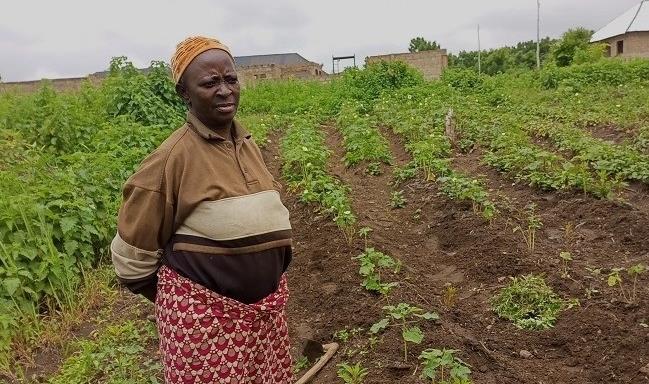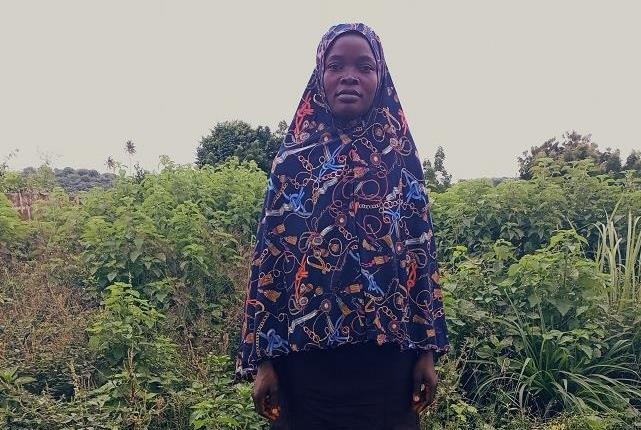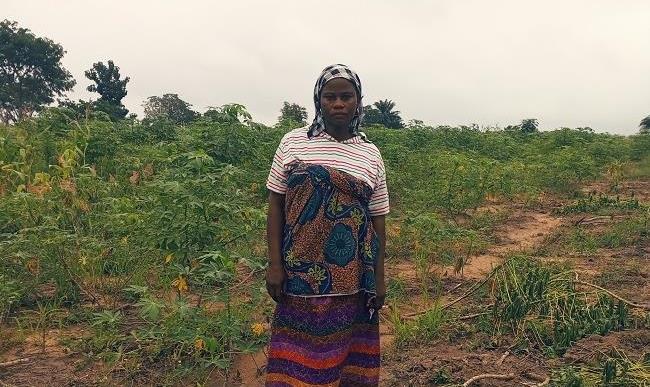In response to COVID-19 emergency food security in 2020, the Oyo State Government created a database of 10,000 smallholder farmers as part of the Oyo Agricultural Micro-Enterprise Scheme. Over 9,300 small-scale farmers in the database received support from the state government through inputs.
Alice Omotosho, a smallholder farmer of okra, pepper and leafy vegetables, heard about a grant package in 2019, in which she applied to expand her small farmland – although it pledged ₦10,000 ($24.4) to all farmers on the list – she cannot remember the name.

Thirty applied, but one of them got the money; her name is Rebecca Araona. “She is a corn saleswoman,” Alice said.
Despite knowing about the Iseyin section of the All Farmers Association of Nigeria (AFAN), a body of all farmers, associations and agricultural cooperatives, she’s not a member. She thinks it’s only for big farmers.
“I’ve never benefited from any grant from the government or commercial banks,” said Alice. But, Rebecca, who was not a farmer, received a grant on July 2020. She doesn’t remember who the donor was, though, the money she got was invested in her corn sale business.
Some 20,000 targeted smallholder farmers in Oyo State who have been severely affected by COVID-19 have received fertilisers, herbicides and climate-resistant seeds as part of the Nigeria COVID-19 Action Recovery and Economic Stimulus (N-CARES) 2020. State Governor, Oluwaseyi Abiodun Makinde, kicked off the program to provide smallholder farmers with flexible and cost-effective leasing options for mechanised agriculture to improve their productivity and livelihoods.
N-CARES, funded $750 million by the World Bank, was coordinated by the Oyo State Agribusiness Development Agency (OYSADA), a government department, to evaluate the priority needs of smallholder farmers, including farm inputs and assets for production. Dr Debo Akande, OYSADA Director General, said the programme is focused on mitigating the impact of COVID-19 – as many smallholder farmers have been affected.
Sophia Abdulrazaq, 34, whose farm is 7 kilometers from her home, did not receive any grant for which she applied during the first quarter of 2021. The grant officials only called her a couple of weeks ago to confirm the exact amount she would need for her farm.

“I’ve been farming for 11 years, growing 20 acres of maize. I’m not a member of AFAN because there are no perks after the meetings,” said Sophia.
Dr Oyedele Adekunle, head of monitoring and evaluation at OYSADA, Ibadan zone, said: “Most farmers have benefited from various economic stimulus programs, yet if you ask them, they will deny being part of it.” He declined to comment on the selection and qualification process for grants.
The only support Mausilat Ahmed, 60, a cassava and maize grower on 4 acres of land, ever received was cassava stems in 2020. Her name wasn’t pre-selected, but she took advantage of it. She leased the farmland for ₦10,000 ($24.4) because it’s owned by a relative. She cultivates corn twice yearly. It benefits more from dry season farming, because there isn’t much supply of fresh corn in the market.
About 4.43 percent of the ₦208.8 billion appropriation bill was allocated to the agricultural sector by the Government of Oyo State. However, the Small Scale Farmers Organisation of Nigeria maintains the budget provisions for agriculture are too low, which is detrimental to productivity and affects the earnings of smallholder farmers—particularly women.
Fund is Mausilat’s major challenge, although she has never applied for a loan from a microfinance bank, due to the high interest rate. Several months ago, a grant programme she applied to on September 2020 sent officials to inspect the kinds of crops she grows. Since that time, she has not heard from anyone.
Rasaq Ariran, the farmers leader of Iseyin, disclosed, most farm women cannot recall the names of the grant programmes they applied to because they have no education. In the past, donor data collection officers would list applicants’ names and banking information.
Before 2015, commercial banks had strict conditions on access to loans for smallholder farmers. The Anchor Borrowers’ Programme (ABP), created in 2015 by the Central Bank of Nigeria (CBN), was to ensure easy access to loans, sustain agribusinesses and value-chains. Based on a 2021 CBN report, since its inception – 3.8 million farmers have benefited from the scheme, and ₦554.61 billion has been disbursed through the programme.
However, Musirat Adewumi Adediran, a grower of maize and cassava on 6 acres of land, said access to loans from microfinance banks is tough.
“Banks have strict demands; they require that we bring in a level 16 public servant to be considered for the loan. I can’t get such loans,” Musirat said.
By 2017, she had applied for an OSEEA Agric. Grant of ₦250,000 ($609.61) – to no avail. OSEEA, Odua Socio-Economic Empowerment Association, was set up to unite and empower the indigenous Yoruba people.
“Since we applied for funding from OSEEA and the Theobarth Global Foundation some years ago, we have not received any handout from them,” adds Rasaq.
When contacted, Moses (second name declined), the personal assistant to OSEEA’s director, said sponsors of the grant, who’re from Ukraine, are constrained by the COVID-19 pandemic. He went on to say OSEEA is an association where every member paid ₦500 ($12.20) for enrollment. He also refused to talk about the donors from Ukraine, but all applicants will have to wait if the request is approved or not.
Attempts to contact the Theobarth Global Foundation and its national coordinator, Philip Shamback by phone and mail – were unsuccessful. It was founded as a non-governmental organisation that regulates all business conglomerates in Nigeria.
AFAN’s woman leader, Alimotou Sulaiman, revealed most of the former recipients of grants were educated persons who were not farmers. Women farmers, without a western education, do not benefit from grants. Since her election in 2020, Iseyin women farmers have received no economic stimulus package.
“My farm has 10 acres of land belonging to another association that gave it to me for free. Whereas other women farmers rent an acre for ₦5,000 ($12.2) per year,” said Alimotou.
Musirat adds: “Each time I invest ₦200,000 ($488) in my cassava farm and earn ₦300,000 ($732), my profit is ₦100,000 ($244). This year I hired a tractor at great cost and bought fertilizer that depleted my capital. By the end of this season, I’d have expended a lot of money.”
“Women farmers’ inability to access these grants and loans makes them unable to expand their existing agricultural activities. They’re not even able to keep their existing farm stable,” said Ngizan Chahul, president of the Nigerian Association of Women in Agriculture (NAWIA).
Fasilat Adefabi, 49, a smallholder farmer and mother of 10, earns ₦150,000 ($366) per hectare – if she self-finances ₦100,000 ($244) on corn and cassava. Yet, the 35 acres belong to her 60-year-old husband.

“Grants should be channelled through AFAN rather than other means, to provide access to funds for the more than 160 women farmers registered in Iseyin. Tractors should cost less to grow and sell more crops,” Alimotou said.
In his temperate voice, Dr Oyedele noted the state has infrastructure problems that limit agricultural production per year. As such, the Central Bank of Nigeria should be critical of how commercial banks would support farmers.
A 2020 United Nations report revealed the pandemic has made rural women’s rights to land and resources more vulnerable. Peasant agriculture generates nearly 80 percent of food in Asia and sub-Saharan Africa and supports the livelihoods of some 2.5 billion people. Women farmers can be as productive as men, but they are less able to access land, credit – and other inputs.
Musirat spends money to raise and support her kids. Access to low-cost fertilizers is a challenge for her, when it is sold for ₦5,000 ($12.2) instead of ₦8,000 ($19.6), since she bought them in installments.
“Lack of access to government grants and loans has made it difficult for these women to operate a larger farm in response to growing demand to raise revenue and feed families. There are willful acts of diversion of these funds by politicians or officials entrusted with distributing these funds to the women farmers,” said Ngizan.
Insufficient rain
A notable decrease in the amount of rain in Oyo in 2020 was discovered as the temperature—which usually ranged from 26 to 31 centigrade, increased to 36 centigrade. With the forecast for persistent rainfall last year by the Nigerian Meteorological Agency (NiMET), farmers expected severe floods. Instead, there was a drought.
Therefore, there was not enough rain for Sophia’s crops to bloom. “I’ve tried growing tomatoes twice. The first time – due to scarce rains, I sold it for ₦1,000 ($2.5) instead of ₦4,000 ($9.76). The second time wasn’t good. I look forward to an abundant 2021 season,” said Sophia.
Even so, by 2020, Mausilat couldn’t harvest half her 4 acres because the rain was scanty.
Last year, the rain only started in June. The farmers admitted how little it fell between June and July and ended suddenly in September before their crops could ripen.
“Women farmers should engage in climate-smart agriculture and adhere to government advisory guides. They should work within the precipitation predictions of the Nigerian Meteorological Agency (NiMET) to reduce losses on agricultural yields,” Dr Oyedele said.
Cattle and crop pest invasion
On August 2021, Musa Dale, 46, Abubakar Musa, 40, and Adamu Maza, 35, were charged in accordance with Sections 516 and 451 of the Criminal Code, Cap 38, Vol.11, Law of Oyo State, 2000, for grazing cattle on farm crops in the village of Aje Oluwa. A spokesman for the government, Wasiu Olatunbosun, said the state had declared the end of open grazing, but was concerned about implementation.
Musirat’s tomato farm was destroyed in 2020. When she reported it to the Fulani chief at Iseyin, who called her to a meeting with the invader, the dispute was resolved without compensation.
However, Alimotou was compensated with ₦10,000 ($24.4), a small fraction of her loss – when she caught cattle ravaging her crops.
“Currently, a state law provides for a fine of ₦500,000 ($1,220) or forfeiture of livestock if caught. The issue – though, is enforcement,” Dr Oyedele disclosed.
In May 2020, Sophia caught a herd of cattle feeding off her crops. She had the intention of calling the police, knowing this, the Fulani chief begged her to decline – and instead solve the tiff in private. Although, she got compensated with meagre money.
Alice invested ₦20,000 ($48.90) in 2020, after harvest – the gains did not measure up, because the pests ate up her crops.
During the 2020 season, crop pests invaded Mausilat’s farm due to low rainfall. She was unable to sell her harvest because it was small.
“Over 68 percent of all agricultural activities that suffered at the hands of marauding herdsmen were smallholder women farmers. NAWIA engages several times in advocacy visits, radio programmes, campaigns and rallies involving the president, legislators, military and the defence minister to end the killings and destruction so that our women can return to the farm to feed themselves, and make ends meet,” said Ngizan.
By Francis Annagu
This story was produced in partnership with the Pulitzer Centre
